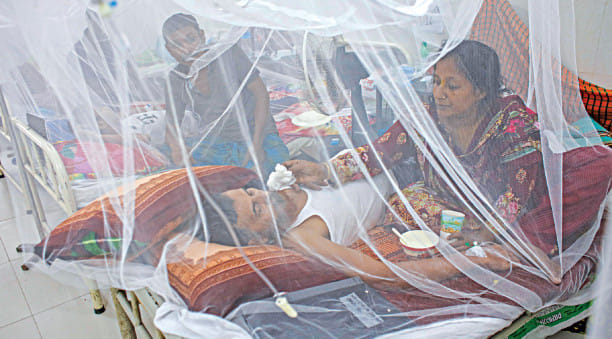Dengue death toll hits 101 amid case surge

The number of dengue deaths in the country has crossed 100 this year, painting an alarming picture of the outbreak.
Three more patients died yesterday, raising the death toll to 101 and total reported cases to 24,183, according to the Directorate General of Health Services (DGHS).
Of the deaths, the highest, 45, were recorded in Dhaka South City Corporation areas, followed by 18 in Barishal division, 17 in Chattogram division, 11 in Dhaka North City Corporation, four each in Khulna and Rajshahi divisions, and one each in Mymensingh division and Dhaka division outside city corporation areas.
Dr HM Nazmul Ahsan, associate professor at Shaheed Suhrawardy Medical College Hospital, said while the number of dengue patients in Dhaka is lower this year, the death rate is higher.
He attributed this to a growing number of cases of Expanded Dengue Syndrome (EDS), a severe form of the disease involving critical damage to organs such as the liver, brain, heart, kidneys and central nervous system.
"These patients can deteriorate rapidly and die suddenly due to severe complications," Dr Ahsan said, adding that people with comorbidities such as hypertension, diabetes, and chronic lung or kidney disease are especially vulnerable.
Many patients fail to recognise warning signs -- severe abdominal pain, breathing difficulty, bleeding, extreme weakness, or a sharp drop in urination and platelet count -- only seeking treatment when their condition is critical.
Dr Ahsan recommended immediate hospitalisation for anyone showing these signs, and early admission for vulnerable groups such as the elderly, pregnant women and those with underlying health conditions.
On the high death toll in Dhaka south, Dr Ahsan explained that many critically ill patients are referred from outside Dhaka to major city hospitals. "They often arrive in critical condition -- infected elsewhere but dying in Dhaka hospitals," he said.
Travel delays are a key factor. "It can take five to six hours to reach a Dhaka hospital from Barishal or other distant districts, plus more time for admission. If a patient is already in shock, these delays can be fatal."
He urged district hospitals to follow national dengue treatment guidelines and treat patients locally, referring only those in critical condition after stabilisation.
Public health expert Dr Mushtaq Hussain noted that while rural areas have a structured healthcare network -- community clinics, union health centres, upazila complexes and district hospitals -- Dhaka lacks such a system.
As a result, many low-income residents seek care only in advanced stages of illness. Limited access to affordable dengue testing also delays diagnosis.
Dr Hussain recommended reorganising dengue care into three levels -- primary, secondary and tertiary -- and strengthening primary healthcare, especially for low-income communities.
He also called for more blood collection centres and expanded secondary care services in Dhaka to reduce the load on medical college hospitals.




 For all latest news, follow The Daily Star's Google News channel.
For all latest news, follow The Daily Star's Google News channel.
Comments